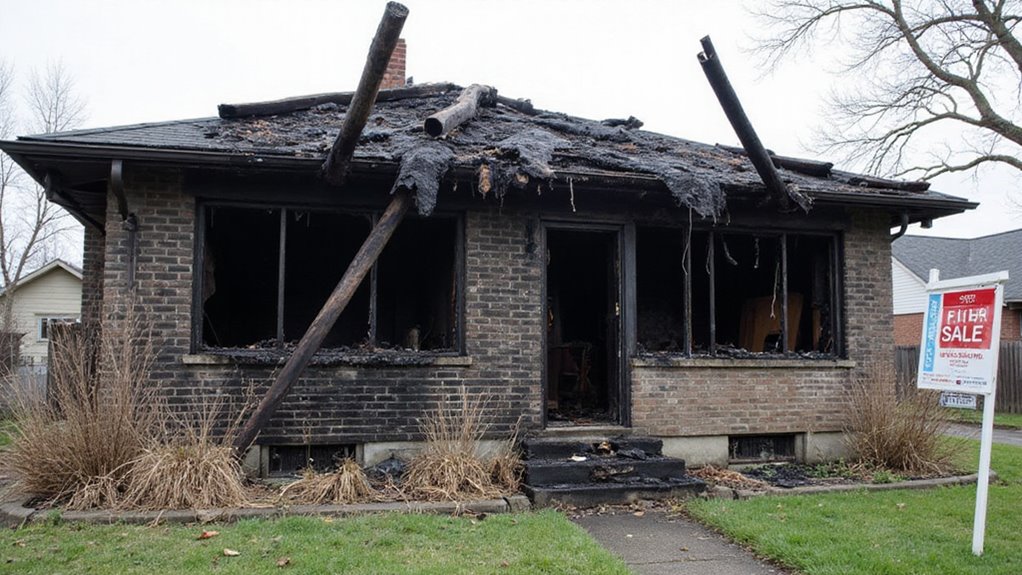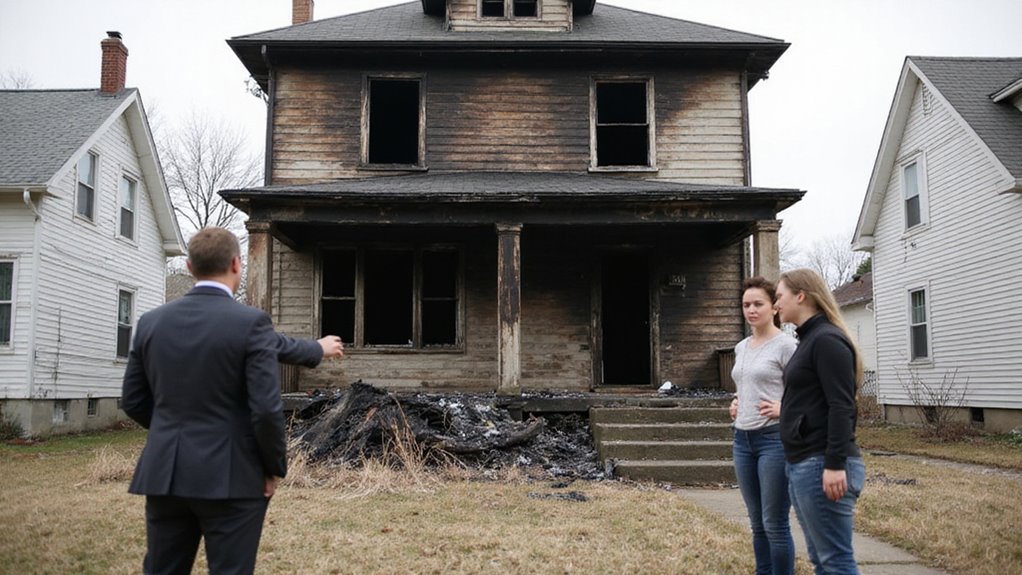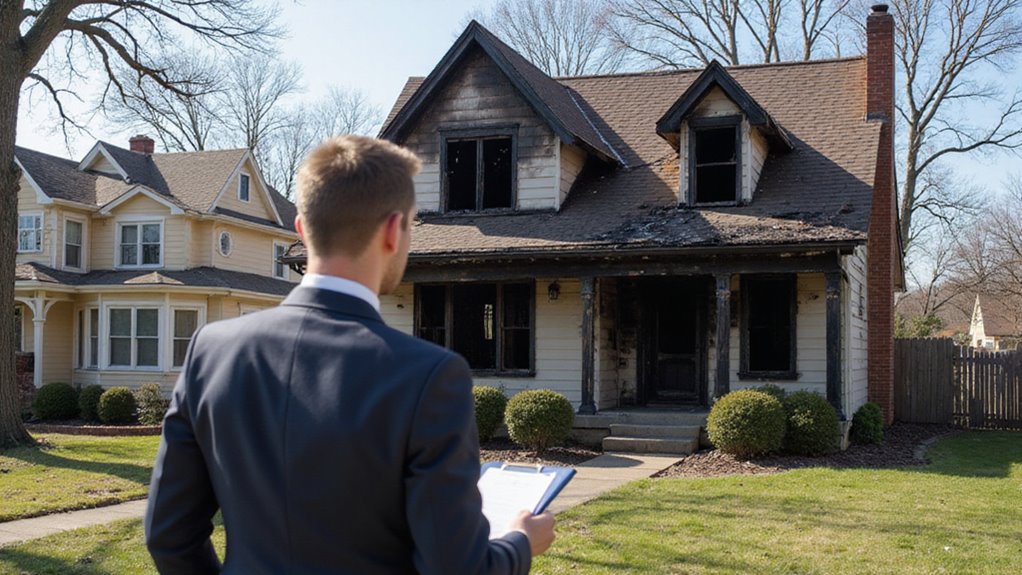Selling a Fire-Damaged House in Cincinnati




Selling a fire-damaged house in Cincinnati can feel overwhelming. Many homeowners worry about big losses and limited buyers. The process seems full of challenges and stress.
Fire damage makes selling a home harder. Buyers may worry about safety, repairs, or hidden problems. Homeowners often fear they must accept a low price or wait months for a sale. But you do have options.
You can sell a fire-damaged house in Cincinnati without massive losses if you use the right strategy. Understanding your rights and the local market gives you power. This blog will guide you through each step so you can make the best choice for your situation.
Table of Contents
Understanding Fire Damage in Residential Properties

Fire damage in residential properties can lower property value and make homes unsafe. Fire harms not only your belongings but also the building’s structure. If you own a fire-damaged house, you must look for both obvious and hidden damage.
Older Cincinnati homes may have old wiring or materials that increase fire risks. Some damage, like weakened framing or bad electrical systems, may not be easy to see. If you suspect hidden issues, always get a professional inspection.
You can help prevent future fires by installing modern smoke detectors. Using fire-resistant materials during repairs also helps keep your home safer. If you address all types of damage, you can protect your home and make smart decisions.
What Happens When Your Cincinnati House Suffers Fire Damage?
When your Cincinnati house suffers fire damage, you’ll need to assess the extent of structural, smoke, and water damage right away. It’s crucial to take immediate safety measures and begin the insurance claims process to protect your interests. Understanding your coverage and next steps will help you recover faster and make informed decisions about selling your property.
Types of Fire Damage in Houses
Immediate Steps After Fire Damage
Insurance Coverage and Claims Process
Fire damage in houses can cause many problems for homeowners. Each type of damage affects your home in a different way. Knowing these types helps you take the right steps after a fire.
Structural damage affects the strength of your walls, floors, or roof. Older homes may need a special check to see if they are safe. If you notice cracks or sagging, call a professional.
Smoke and soot damage leaves stains and strong smells on surfaces. Smoke can get deep into carpets, curtains, and furniture. If you see black marks or smell smoke, cleaning quickly can help.
Water and chemical damage often happen when firefighters put out the flames. Water can soak into wood, drywall, and floors, leading to mold later. If chemicals were used, they may harm paint or finishes.
If you spot any of these problems, act fast to protect your home. Early action can save money and keep your house safe. If you have a historic home, extra care may be needed to protect its value.
If your Cincinnati home suffers fire damage, focus on safety first. Do not go inside until the fire department says it is safe. If possible, secure the property to stop further damage or injuries.
Board up windows and doors if they are open or broken. Quick action can prevent more problems and keep out unwanted visitors. If you wait too long, damage may increase and risks may rise.
Contact professionals to check structural safety and smoke damage. They can find hidden hazards and provide the right repairs. If unsure about next steps, ask experts for advice.
Fire prevention depends on working smoke alarms. After a fire, protect what is left and follow a plan. Staying proactive reduces further loss and stress.
After a fire, you should contact your homeowner’s insurance provider as soon as possible. Quick action helps your claim get processed faster. The insurance company will guide you step by step.
If you have taken fire safety measures, make a note of them. You should also document all fire and smoke damage clearly. Photos, receipts, and a list of damaged items are helpful.
An insurance adjuster will visit to inspect the damage. The insurance company will review your documents and damaged items. If your policy covers the damage, you may receive a payout.
If you understand your policy’s fire safety rules and coverage limits, you can avoid surprises. Organized records make your claim stronger. Quick, careful action helps you recover sooner.
How to Sell a Fire-Damaged House in Cincinnati
To sell a fire-damaged house in Cincinnati, you’ll need to assess the extent of the damage and get a professional evaluation to understand what repairs are needed. Calculating repair costs, gathering the right documentation, and complying with local disclosure laws are essential steps to protect yourself and attract serious buyers. By approaching each requirement methodically, you can streamline the process and secure the best possible outcome.
Assessing the Extent of Fire Damage
To sell a fire-damaged house in Cincinnati, you must first assess how much damage the fire caused. This means looking at both visible and hidden areas that may be affected. An honest and detailed assessment helps buyers understand the home’s true condition.
You should check the structure, including the framing, foundation, and load-bearing walls. If any of these areas are damaged, repairs may be necessary before selling. A professional inspection can help if you are unsure.
Historic features in older homes may need special attention. If your house has unique or old elements, note any damage to these parts. Some buyers might see value in preserving or restoring them.
The home’s architectural style can also affect repair methods and costs. If certain style elements were damaged, record these details for potential buyers. Clear information about damage and repairs builds trust with buyers.
Getting Professional Damage Assessment
Getting a professional damage assessment is important after a fire. A licensed expert checks your home for all fire damage, both visible and hidden. This step helps you find problems you might miss on your own.
The professional will inspect your home’s walls, roof, and foundation to check for structural issues. They also look at the electrical wiring to make sure it is safe. If any wires are damaged, they will point it out for repairs.
Smoke detectors and fire barriers are inspected to ensure your home remains safe. The expert tests each smoke detector to confirm it works and is in the right place. If they find problems, they will recommend fixes.
A detailed report from the inspection shows you the full extent of fire and smoke damage. This report helps you decide what repairs are needed before selling your house. If you plan to sell, this information can help you answer buyers’ questions honestly.
Calculating Repair Costs
Calculating repair costs helps you know your home’s real value after fire damage. You need to add up all repairs, including hidden damage. Accurate estimates will guide your next steps.
Start with areas affected by fire, such as roofs, walls, and floors. If smoke is present, consider cleaning or replacing insulation and air ducts. Smoke odors may need special treatment.
Professional estimates can help you budget for each repair. Essential repairs should come first, especially if they affect safety or future sale. If Cincinnati requires code upgrades, include those in your costs.
Documentation Requirements
You need the right paperwork to sell a house with fire damage. Gather the fire incident report from the local fire department. Collect all insurance claim documents about the fire.
If any repairs were made, keep receipts and contractor details. Include before-and-after photos to show the work done. These records help buyers understand the damage and repairs.
Buyers may ask for proof of working smoke alarms. Provide maintenance records for any safety equipment. Good documentation can make selling your house easier and faster.
Disclosure Laws in Cincinnati
Cincinnati’s disclosure laws require you to tell buyers about any fire damage when selling your house. Sellers must reveal all known material defects, including past fires. If you hide this information, you could face lawsuits or lose the sale.
You should list all fire incidents, repairs, and remaining damage in your disclosure form. Sellers need to show proof of any restoration work and inspections done. If you follow the law, you protect yourself and make buyers feel confident.
Cincinnati has strict fire safety rules due to its history. Buyers and officials will check your disclosures closely. Meeting these requirements helps make the sale process smoother and legal.
What Are Your Options for Selling a Fire-Damaged House?
When you’re ready to sell a fire-damaged house, you have several practical options. You can sell as-is to traditional buyers, invest in repairs before listing, work with a real estate agent, or sell directly to investors. Let’s examine how each path affects your timeline, costs, and potential profit. Selling a fire-damaged house to traditional buyers is possible if you market the property as-is. Some buyers may want a home with historical charm or a good location. If your house qualifies, you can attract these buyers.
Owners should highlight unique features and restoration potential. Local preservation groups may show interest if the house has historical value. Community outreach can help you find buyers who care about neighborhood improvement. Full disclosure of the damage is important when selling as-is. Buyers appreciate honesty and clear information. If you are transparent, you build trust with potential buyers.
Repairing Before Listing
Working with Real Estate Agents
Selling to Investors
Repairing your fire-damaged house before selling can help you attract more buyers. This step may also increase your final sale price. Buyers prefer homes that are move-in ready and safe.
You should fix all structural and cosmetic problems. Fire safety improvements, like new smoke detectors, are important and can reassure buyers. Meeting inspection rules is easier when you include these upgrades.
If possible, hire licensed contractors for the repairs. They make sure all work is safe and legal. Always keep records of what was fixed and who did the work.
Detailed repair documents show buyers your home is safe and well maintained. Professional restoration and modern safety features can set your property apart in Cincinnati. This approach can help you ask for a higher price after repairs.
If you work with a real estate agent, you should have a clear strategy. Many homeowners do not want to fix fire damage before selling. An agent can help you understand your options in this situation.
Choose an agent who has experience with fire-damaged or distressed homes. The agent should know local laws and the history of Cincinnati properties. If you want the best results, you need someone with this background.
A good agent will suggest ways to market the home’s potential or unique features. The agent can also advise you on following local rules about selling fire-damaged homes. If you are unsure about listing, an agent can help you decide what is best.
Listing a fire-damaged house may mean fewer buyers and lower offers. Your agent will set realistic expectations for the sale. If you want to avoid surprises, you should discuss these risks early.
Selling to investors is a fast way to sell a fire-damaged house without making repairs. Investors buy homes in any condition. This means you do not need to spend money fixing fire damage.
Investors, such as Prestige Investments Cincinnati, make cash offers based on the home’s current state. They consider fire damage and safety concerns during their assessment. If you accept the offer, they handle the paperwork.
Working with investors avoids long listing times and the risk of buyers backing out. They take care of legal details for you. If you want a quick sale, a local investor could be your best option.
Submit Your Information Below For A Cash Offer On Your Property
Common Challenges When Selling Fire-Damaged Properties

When you sell a fire-damaged house, you’ll face tough price negotiations, buyer hesitation, and hurdles with financing. Insurance complications can also slow down or disrupt your sale. To navigate these challenges, you need to understand the main obstacles and how to address them effectively.
Price Negotiations
To get a fair deal for a fire-damaged house in Cincinnati, prepare for buyer questions about repairs and safety. Buyers will likely consider repair costs, fire safety, and working smoke detectors when making an offer. Having clear information ready will help you during negotiations.
Sellers should collect detailed estimates for all needed repairs. Any steps taken to reduce fire risks can make the home more appealing. If you have fixed anything, show proof.
Listing upgrades, especially those that improve safety and follow local laws, can help your case. Receipts for new smoke detectors, safety checks, or repairs should be available. Honest details about the damage and quotes from trusted contractors can also support your price.
If you follow these steps, buyers may feel more confident in your asking price. Being open and prepared can make negotiations smoother. Your effort can lead to a better outcome.
Buyer Hesitation
Many buyers hesitate to purchase fire-damaged properties. They often worry about fire cleanup, smoke damage, and possible hidden problems. Concerns about health risks and structural safety are common.
If buyers doubt repairs, they may question the home’s future value. Inspection reports and repair documents can address these concerns. Professional certifications help show that the property is safe.
Sellers should provide records of all cleanup and repairs. If you share inspection results, buyers can feel more confident. Honest, clear communication builds trust and helps move the sale forward.
Financing Issues
It is hard to get a mortgage for fire-damaged homes. Lenders see these homes as risky and may refuse financing. This means most buyers must pay cash or use other funding.
An appraiser may value your home lower because of the damage. Lenders might ask for proof that fire safety systems are working again. If repairs are expensive, many buyers will not get loan approval.
If you want to sell, focus on cash buyers or real estate investors. You can also fix basic safety issues to attract more interest. If you do this, selling may be easier and faster.
Insurance Complications
Managing insurance claims can be difficult when selling a house damaged by fire. Insurance companies have strict rules and may take a long time to decide. Disagreements about the damage or payout can also cause delays.
Insurance companies sometimes argue about what they should cover. They may also offer less money than needed for repairs or settlement. This can make selling your house harder.
If you want to avoid problems, keep careful records. Take photos, save receipts, and get professional damage reports. If you have trouble with your insurance, ask your agent questions or talk to a lawyer.
Legal Requirements for Selling Fire-Damaged Houses in Cincinnati
When selling a fire-damaged house in Cincinnati, you need to understand state regulations, pass all required inspections, and meet strict disclosure requirements. If you skip any step, you risk legal trouble and delays. By addressing these legal obligations up front, you protect yourself and make the sale smoother.
State Regulations
Selling a fire-damaged house in Cincinnati must follow Ohio’s state rules. Ohio law says you must tell buyers about fire damage and repairs. This ensures the sale follows the law and prevents future problems.
Homeowners must share any known fire-related issues, such as damaged wiring or smoke residue. Written proof about the fire and any repairs is also required. If changes were made, these must meet Cincinnati’s building codes.
Sellers should check that all repairs follow Ohio’s property disclosure laws. Full honesty protects you from legal trouble. Buyers can make better choices if they have all the facts.
Required Inspections
You must schedule required inspections to meet legal standards before selling a fire-damaged house in Cincinnati. The city usually asks for fire, structural, electrical, and sometimes plumbing inspections. These checks confirm if your property is safe or needs repairs.
Inspectors look for hidden problems beyond visible damage. They may find issues with decor, landscaping, or unseen areas. Even if the outside looks fine, there might be smoke or structure damage.
If you arrange inspections early, you avoid legal problems later. Buyers will also know you have fixed safety concerns. Complete all inspections before you start selling your house.
Disclosure Requirements
Ohio law requires sellers to disclose any fire damage and repairs when selling a house in Cincinnati. This is not optional. Sellers must use a written Residential Property Disclosure Form.
The form should state the date and cause of the fire. It must list all repairs and note any ongoing problems. These could include damaged wiring or smoke smells.
If you updated fire prevention features, mention them. Updates may include new smoke detectors or electrical work. Buyers want to know about these steps. Accurate disclosure helps prevent legal trouble. It also helps buyers trust you. Clear information makes the sale process smoother.
Tips to Maximize Value When Selling Fire-Damaged Houses
To get the best possible price for your fire-damaged house, you’ll need to focus on proper documentation, professional photography, strategic pricing, and smart marketing. Each of these steps helps you present your property honestly while highlighting its powerful potential to buyers. Let’s look at how you can use these tactics to maximize your home’s value in the Cincinnati market.
Proper Documentation
Proper documentation is important when selling a fire-damaged house in Cincinnati. It shows the property’s condition and the steps you have taken to fix it. This helps buyers feel confident about your home.
If you keep careful records, you can answer buyer questions easily. Organized paperwork also makes the selling process faster and smoother. It may even help you get a better sale price.
Collect fire incident reports from the fire department. Save all receipts for repairs and restoration work. Keep proof of updates to safety features like smoke detectors.
Buyers will trust you more if you provide these documents. If you show clear records, buyers may be willing to pay more. Proper documentation can set your house apart from others on the market.
Professional Photography
Professional photography can help sell a fire-damaged house. High-quality photos show the best features of your property. Good lighting and angles can draw attention away from damaged areas.
Home staging can further improve the look of each room. Arranging furniture can make flaws less noticeable. This makes the home feel more welcoming to buyers.
Virtual tours give buyers a better look at the space. These tours let people see the layout and condition easily. If buyers trust what they see, they may show more interest.
If you combine these tools, your house will look its best. This can attract serious buyers and help you get a better price. Investing in photography and tours is a smart choice if you want to sell fast.
Strategic Pricing
Pricing is important because it affects your whole sales strategy. You should research carefully before setting a price for a fire-damaged house in Cincinnati. Look at recent sales of similar damaged homes in your area.
If you see a pattern in these sales, use this as your price guide. Always check how fire safety rules changed the sale price of those homes. If these rules increased costs, adjust your price to reflect this.
Include repair estimates and share these with buyers. If you show buyers clear documents, they will trust your price more. Strategic pricing helps attract serious buyers and makes selling smoother.
Marketing Strategies
To attract serious buyers and get the best price for a fire-damaged house in Cincinnati, focus on its potential. Show how the property can be improved, especially if it is in a historic area. Mention that the house could be restored and its character preserved.
If the house has fire damage, always disclose this information. Explain any repairs or updates that have already been made to meet safety codes. Buyers will feel more confident if you show how you have handled these issues.
Use marketing channels like investor groups, cash buyers, and real estate websites for damaged homes. Provide clear and honest photos and descriptions. Offer contractor estimates or building plans to help buyers see what the house could become.
Markets We Buy Houses In
Need a Quick Solution? Sell Your Fire-Damaged House to Prestige Investments Cincinnati

If you need to sell your fire-damaged house quickly, Prestige Investments Cincinnati can help. We buy homes in any condition for cash. You will not need to make repairs or upgrades.
Prestige Investments Cincinnati manages all paperwork and legal steps for you. If you choose us, you avoid the stress of traditional selling. Our team can close on your timeline.
You will not pay hidden fees or face last-minute changes. If you want a fair price for your damaged home, we can provide it. Trust us for a simple and fast sale process.
Selling a Fire-Damaged House in Cincinnati: Frequently Asked Questions
Can I sell my house in Cincinnati if it has fire damage?
Yes, you can sell a fire-damaged house in Cincinnati. Many real estate investors and cash buyers specialize in buying homes in as-is condition, including those with fire damage.
Do I need to repair fire damage before selling?
No, repairs are not required. You can sell the home “as-is,” especially to cash buyers who will handle the repairs themselves after purchase.
Who buys fire-damaged houses in Cincinnati?
Local cash buyers, real estate investors, and some home buying companies purchase fire-damaged homes. They often close quickly without requiring repairs or inspections.
How do I price a fire-damaged house?
The price depends on the extent of the damage, location, and market conditions. A local real estate agent or cash buyer can help estimate a fair value based on the home’s post-repair value.
Will insurance affect the sale?
Yes. If you’ve filed a fire insurance claim, the payout may cover some damage. Make sure the claim is settled or disclosed during the sale process. Some buyers may ask for details of the insurance settlement.
How fast can I sell a fire-damaged house in Cincinnati?
If selling to a cash buyer, the process can take as little as 7–14 days. Traditional sales might take longer due to inspections, repairs, or financing delays.

